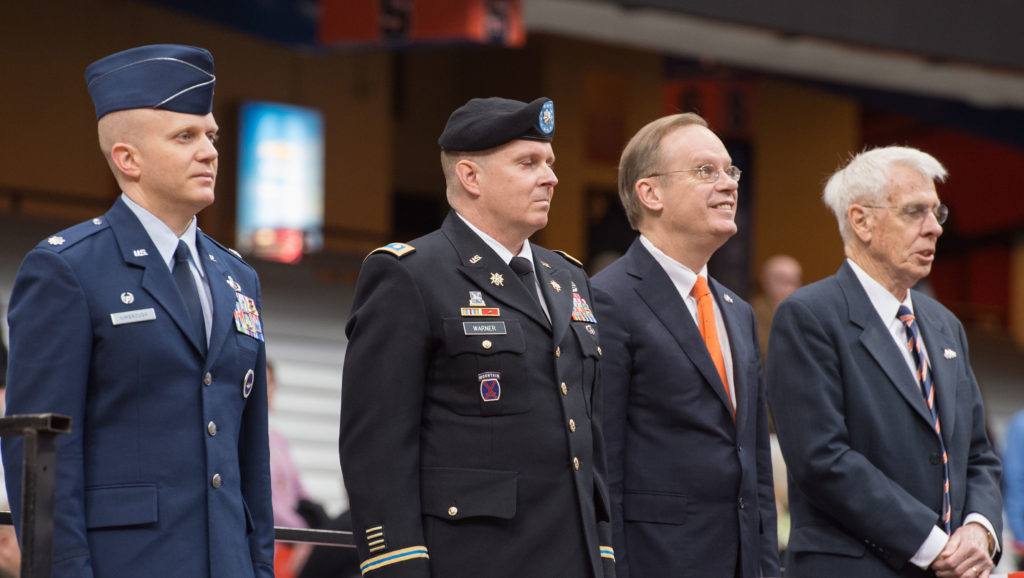 Syracuse.com interviewed Chancellor Syverud this week to get his insight on leadership and how Syracuse University is the Best Place for Veterans since next week, April 19 and 20, The Chancellor will welcome leaders from around the United States to Syracuse University for the first of its kind “National Veterans Summit.” Military leaders, university presidents, and government officials will attend.
Syracuse.com interviewed Chancellor Syverud this week to get his insight on leadership and how Syracuse University is the Best Place for Veterans since next week, April 19 and 20, The Chancellor will welcome leaders from around the United States to Syracuse University for the first of its kind “National Veterans Summit.” Military leaders, university presidents, and government officials will attend.
During his tenure, Syverud has made serving the nation’s troops and military veterans a hallmark of SU. It builds on a long SU tradition that accelerated in the 1940s when SU Chancellor William Tolley helped to draft and implement the G.I. Bill, giving millions of America’s veterans a shot at college after World War II.
What are your expectations for next week’s summit?
Well, Syracuse University wants to be the best university in the country for veterans and military-connected students, period. We’re quite a ways along toward that goal – we’re certainly recognized as the best private university.
We’re realizing that part of being the best is also being the thought leader for the country in how higher education can help address the nation’s challenges in military service.
The biggest challenge right now in military service is we’re at the 50-year mark of the all-volunteer force. Less than 1 percent of people are in families that have anyone who has served, and all branches of the military are missing their recruitment goals. The Army was 15,000 people short of recruiting this year. Even the military academies are seeing a sharp drop in applications.
So what do we do about it? How does higher education own that rather than view it as an interesting thing that happens to those people who chose not to go to higher education?
There are many reasons to enlist in the military, but it turns out that the main reason people have historically enlisted for the last 50 years is so they can afford a college education. That reason is not what most of the academy assumes. It turns out that most of the people enlist as their way to pay for a college education.
So given that reality, we’re trying to figure out a way to help the military fully staff and to give the people who go into military service a higher education, not years and years away, but sooner and more persuasively so that we can staff our military, which is fairly important to our national security.
We have more than 3,000 military-connected students. A larger percentage of our students at Syracuse are doing military service than at our peers, probably 60 times the rate at most of our peers.
We have large Reserve Officer Training programs, both Army and Air Force. They’re the largest they’ve been since the 1970s, but that’s a fraction of our military-connected students. We have veterans and active-duty people in our online programs, and lots of military dependents as well. We trained 164,000 enlisted personnel in the last seven years for the transition to civilian life. We have the military photojournalism program. The Whitman School trains most of the accountants in the military.
We’ve taken over training the sergeant majors at majors at Fort Bliss, which is in Texas. Sergeant majors are the main kind of workhorses of Army basic training and other things. They get their master’s degrees from Syracuse. We have lots of specialized programs aimed at training military personnel. (Syracuse University’s D’Aniello Institute for Veterans and Military Families oversees training for about 26,000 veterans a year in Syracuse and at 68 military installations in the U.S. and at eight American military bases overseas.)
Syracuse University is unique. Most of higher education in America has less than one 10th of 1 percent military-connected students, which is embarrassing because most of the military-connected students are going to for-profit institutions or community colleges where they’re feeling more welcome. Allegedly elite higher education is not serving people who have chosen to serve the country. There’s something morally wrong about that that we are trying to correct.
Read the rest of the interview at syracuse.com
